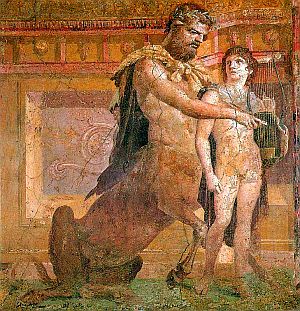 |
Centaurus
Although the name Centaurus or Centaur is somewhat generic, the constellation represents a very
specific centaur named Chiron, the one that Homer called the "wisest and justest of all the centaurs."
in the Iliad.

Wikipedia tells us, that in Greek mythology, "... Centaurs were notorious for being wild, lusty,
overly indulgent drinkers and carousers, violent when intoxicated, and generally uncultured delinquents. Chiron, by contrast, was intelligent,
civilized and kind, because he was not related directly to the other centaurs due to his parentage. He was the son of the Titan
Cronus and the Oceanid
Philyra."

Ian Ridpath adds to the story, that "...Cronus ... one day caught and seduced the sea
nymph Philyra. Surprised in the act by his wife Rhea, Cronus turned himself into a horse
and galloped away, leaving Philyra to bear a hybrid son.

Chiron grew up to be a skilled teacher of hunting, medicine, and music; his cave on Mount Pelion
in eastern Greece became a veritable academy for young princes in search of a good education. Chiron was so trusted by the gods and heroes of ancient
Greece that he was made foster-father to Jason (of Argonauts fame) and
Achilles; but perhaps his most successful pupil was
Asclepius, son of Apollo, who became the greatest of all healers and is commemorated in the
constellation Ophiuchus."

In the end, however, Chiron died a tragic and unfortunate death, but even in death, he displayed the greatness of his character. There are several variants of
the story of Chiron's death. They all have in common that Chiron was accidentally wounded by his friend and student Heracles
with one of the arrows that that had been treated with the blood of the Hydra.

For mortals, these arrows meant instant death; for the immortal son of a Titan, it meant agonizing pain for eternity. Chiron therefore decided to
give up his immortality and ask Heracles to negotiate a trade with his half brother Zeus: His life for
the life of Prometheus.

Zeus grudgingly agreed and after Chiron's death, he placed the noble centaur in the sky.

In Greek mythology, Prometheus was the titan who is credited with the creation of humanity from
clay, and who defies the gods by stealing fire and giving it to humanity. For this act, he was punished by Zeus and chained to the Caucasus Mountains
for eternity.

Prometheus is arguably the most famous Greek hero who did NOT receive his own star or constellation. It took 2000 years, until humanity honored
the fire-bringer with a place in the skies. In 1960, a small rock with approximately 14 kilometers in diameter in the outer region of the asteroid belt was
named Prometheus. In 1985, one of the inner moons of Saturn, discovered during the
Cassini mission also was named Prometheus.

Sources:Wikipedia, Ian Ridpath,
Chandra Observatory
|
|


 Chiron, Peleus and infant Achilles
Chiron, Peleus and infant Achilles
from Hutchinson, A book of Greek fairy tales, 1914
Source: Wikipedia
 The Education of Achilles by Chiron
The Education of Achilles by Chiron
fresco from Herculaneum, 1st century AD
Source: Wikipedia
 Heracles frees Prometheus
Heracles frees Prometheus
by Carl Bloch (1834–1890)
Source: greeklegendsandmyths.com
|















